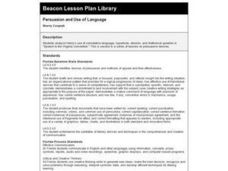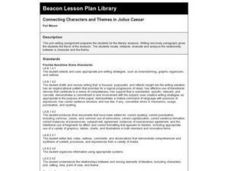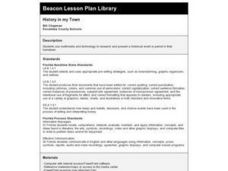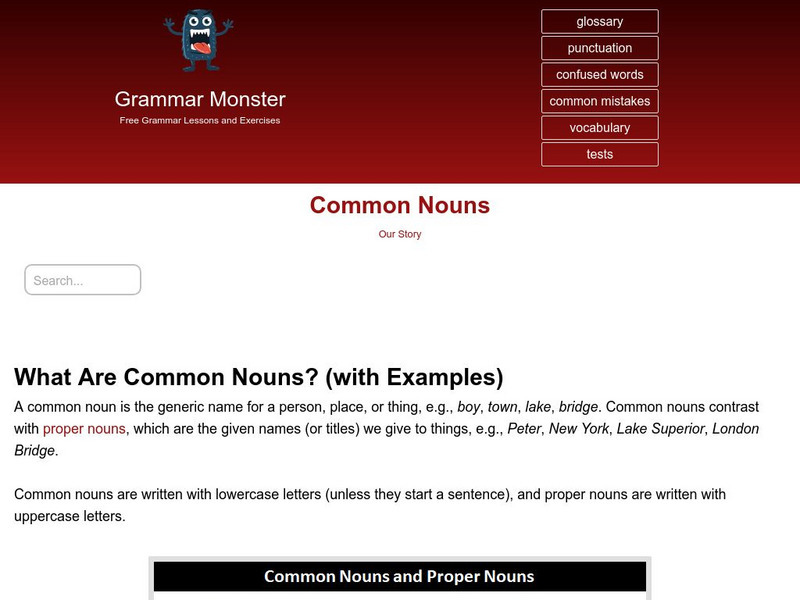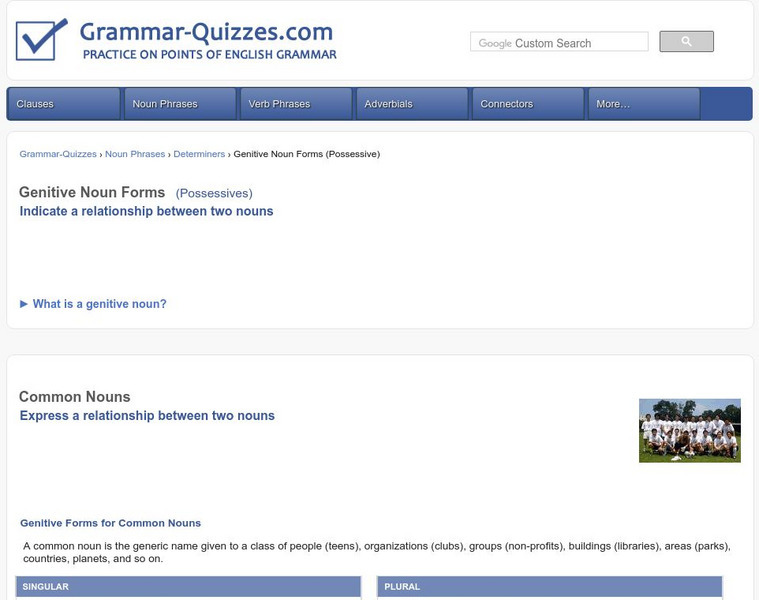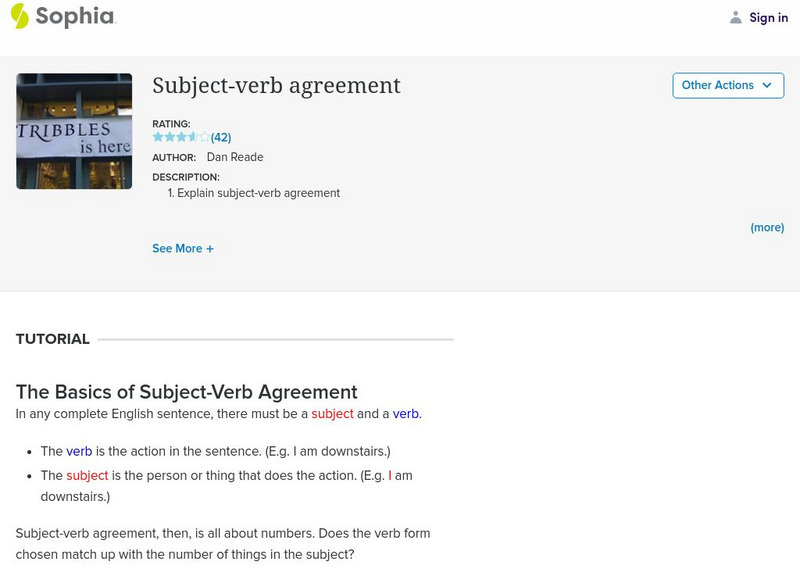Curated OER
Law/Lore
In this law and lore activity, students choose the correct word to complete each sentence. Students choose either law or lore for 10 sentences.
Curated OER
Persuasion and Use of Language
Students discuss connotative language, hyperbole, allusion, and rhetorical question. In small groups, they read one section of the "Speech to the Virginia Convention" and analyze these devices. Groups present their results to the class.
Curated OER
Connecting Characters and Themes in Julius Caesar
Fourth graders prepare for the literary analysis. They locate, interpret, evaluate and analyze the relationship between a character and the theme. After a lecture/demo, 4th graders write topic and detail sentences, then correctly put...
Curated OER
What Do You Call Older People?
Students brainstorm a list of words they use to refer to the elderly. As a class, they discuss the importance of word connotations and explain those used to refer to the older population. They complete a handout and share their thoughts...
Curated OER
Roll Out the Run-ons
Students participate in activities in order to investigate the concept of run-on sentences. They identify a complete sentence and the correct characteristics that it possesses.
Curated OER
Prepositions of Time--For, During, While
In this prepositions of time worksheet, students discover the rules for using the prepositions "for," "during," and "while."
Curated OER
History in my Town
Fourth graders research a historical period in their hometown and use PowerPoint to present it to the class.
Other
Grammar Monster: What Are Common Nouns? (With Examples)
Get a better understanding of nouns with definitions and examples of common nouns, examples of common and proper nouns, noun capitalization rules, common noun categories, and a video [5:21] on common and proper nouns.
Capital Community College Foundation
Guide to Grammar and Writing: Abstract Nouns
The composition of a noun is more than just a person, place or thing. Use this resource to study examples of nouns and their many uses.
Get It Write
Get It Write: Capitalization: Proper vs. Common Nouns and Adjectives
Learn how to distinguish proper nouns and adjectives from common ones so you will be able to capitalize them correctly. This tutorial gives several examples and detailed explanations. A brief quiz will check your understanding.
TES Global
Tes: Nouns: Revision: Explanation Booklet
[Free Registration/Login Required] This seven-page resource provides definitions for different categories of nouns: common, proper, collective, hyphenated, compound, and abstract. Numerous examples with pictures are provided for each...
Grammarly
Grammarly Blog: Nouns
This page focuses on nouns including definitions, types of nouns (person, place, thing/idea), common vs proper nouns, types of common nouns (concrete, abstract, collective), nouns as subjects, nouns as objects, nouns as subjective and...
Capital Community College Foundation
Guide to Grammar and Writing: Nouns
A complete tutorial on identifying and using nouns that starts with identifying the nouns in "My Favorite Things" from The Sound of Music. Includes links to other noun grammar pages.
University of Texas at Austin
Intoduction to French Nouns
This concise overview of French nouns inncludes a general definition, examples of gender and number, count vs. mass and common vs. proper.
Other
Grammar quizzes.com: Possessive Nouns: Indicating Possession
A series of carts containing rules and examples of possessives including singular and plural common nouns, proper nouns, inanimate nouns, days and holidays, and numbers and letters. A fourteen-question practice exercise follows the...
Other
Grammaropolis: The Nouns
This is a lesson in nouns including defining nouns, common, proper, concrete, abstract, compound, and collective nouns. It defines each type, shows its use in a sentence, and provides examples.
University of Victoria (Canada)
University of Victoria: Study Zone: Regular Plurals of Nouns
Information and examples of how to make the regular plural form of common nouns.
Get It Write
Get It Write: Distinguish Between "Effect" and "Affect"
"Effect" and "affect" are tricky words to keep straight. Each can be used as a noun or a verb, depending on the meaning of the sentence. This tutorial gives clear examples and explanations on the use of these two words. A brief quiz...
Sophia Learning
Sophia: Capitalization
This tutorial teaches standard rules of capitalization and common errors. It offers a PowerPoint presentation over the rules for capitalizing proper nouns and information on capitalizing abbreviations with examples. This is followed by...
Sophia Learning
Sophia: Subject Verb Agreement
This tutorial focuses on subject-verb agreement in a variety of media. It provides the basic rules of subject-verb agreement with examples in textual format. It also provides a YouTube video with in-depth rules for subject-verb agreement...
Other
Spanish in Texas: Spanish Grammar in Context Introduction to Negation
This Spanish language reference clarifies information about types of nouns. Examples related to common vs. proper nouns, count vs. mass nouns, singular vs. plural nouns, masculine vs. feminine nouns are included. Audio and written...
Grammarly
Grammarly Blog: Capitalization: Family Relationships (Used as Proper Names)
This page explains that family relationships such as Mom, Dad, Uncle, and Aunt are capitalized if they are used as names, but are not capitalized if used as common nouns such as my mom, his dad, etc. Examples are provided.
Grammarly
Grammarly Blog: Comma Use Around Interrupters
This page focuses on the need for commas around interrupters in sentences and provides examples. Common interrupters include in fact, to say the least, however, generally speaking, sadly, happily, and unfortunately. Nouns of address can...
Sophia Learning
Sophia: Comma Sense
Notes, a PowerPoint presentation, and a video introducing commas, their purpose, and common usage mistakes. Comma rules and examples concerning coordinating clauses, items in a list, introductory elements, and nouns of direct address are...



